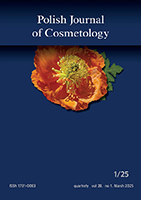search by
Copyright @ Pol J CosmetolEvaluation of effectiveness of supplementation of nutricosmetic in the form of jellies - pilot studiesWioletta Tomaszewicz 1/, Ariel Liebert 2/, Anna Długosz 3/, Joanna Gracz 3/, Jacek J. Klawe 1/ 1/ Katedra Higieny, Epidemiologii, Ergonomii i Kształcenia Podyplomowego, Wydział Nauk o Zdrowiu, Collegium Medicum w Bydgoszczy, Uniwersytet Mikołaja Kopernika w Toruniu 2/ Katedra Gastroenterologii i Zaburzeń Odżywiania, Wydział Nauk o Zdrowiu, Collegium Medicum w Bydgoszczy, Uniwersytet Mikołaja Kopernika w Toruniu 3/ Katedra Inżynierii i Analityki Chemicznej i Spożywczej, Wydział Technologii i Inżynierii Chemicznej, Politechnika Bydgoska im. Jana i Jędrzeja Śniadeckich Summary Introduction. An improperly balanced diet significantly affects the condition of the hair. Deficiencies of nutrients, mainly vitamins and minerals, may result in weakening the overall condition of the hair and excessive hair loss. Providing bioactive ingredients in a concentrated form can help meet the body´s needs for the above-mentioned ingredients. The dietary supplements market is growing year by year. The range of dietary supplements is enriched with products available in various forms and characterized by a different formulation. Aim. To evaluate the effectiveness of a 3-month supplementation with nutricosmetics in the form of jellies. Material and methods. The study involved 20 women, with an average age of 47.1±11.6 years, who were subjected to oral supplementation with nutricosmetics in the form of jellies for a period of 3 months. Immediately before and after the end of the treatment, an elemental analysis of the hair composition was performed using the atomic absorption spectrometry method. The content of the following elements was determined: zinc (Zn), selenium (Se) and manganese (Mn). Results. The study sample was dominated by women aged 51-60 (35.2%). About 82% of the respondents have higher education, and 88.2% did not have chronic diseases. According to 35.3% of the study participants, hair loss before supplementation was excessive. In turn, more than half of the women (52.9%) considered the general condition of their hair "good" before the test. From the effects obtained as a result of the treatment, 53.0% of the respondents were "satisfied" and 29.4% "very satisfied". As a result of supplementation, a statistically significant increase in the content of selenium (119.35%) and manganese (33.33%) in the hair was observed in relation to the content of the above-mentioned. elements before supplementation. No statistically significant differences were observed in the increase of zinc before and after supplementation. Conclusion. The studies showed that the 3-month supplementation with the tested nutricosmetic in the form of gummies is effective and may have a positive effect on the condition of the hair. Key words: hair condition, dietary supplements, nutricosmetics, microelements, macroelements, elemental analysis |




